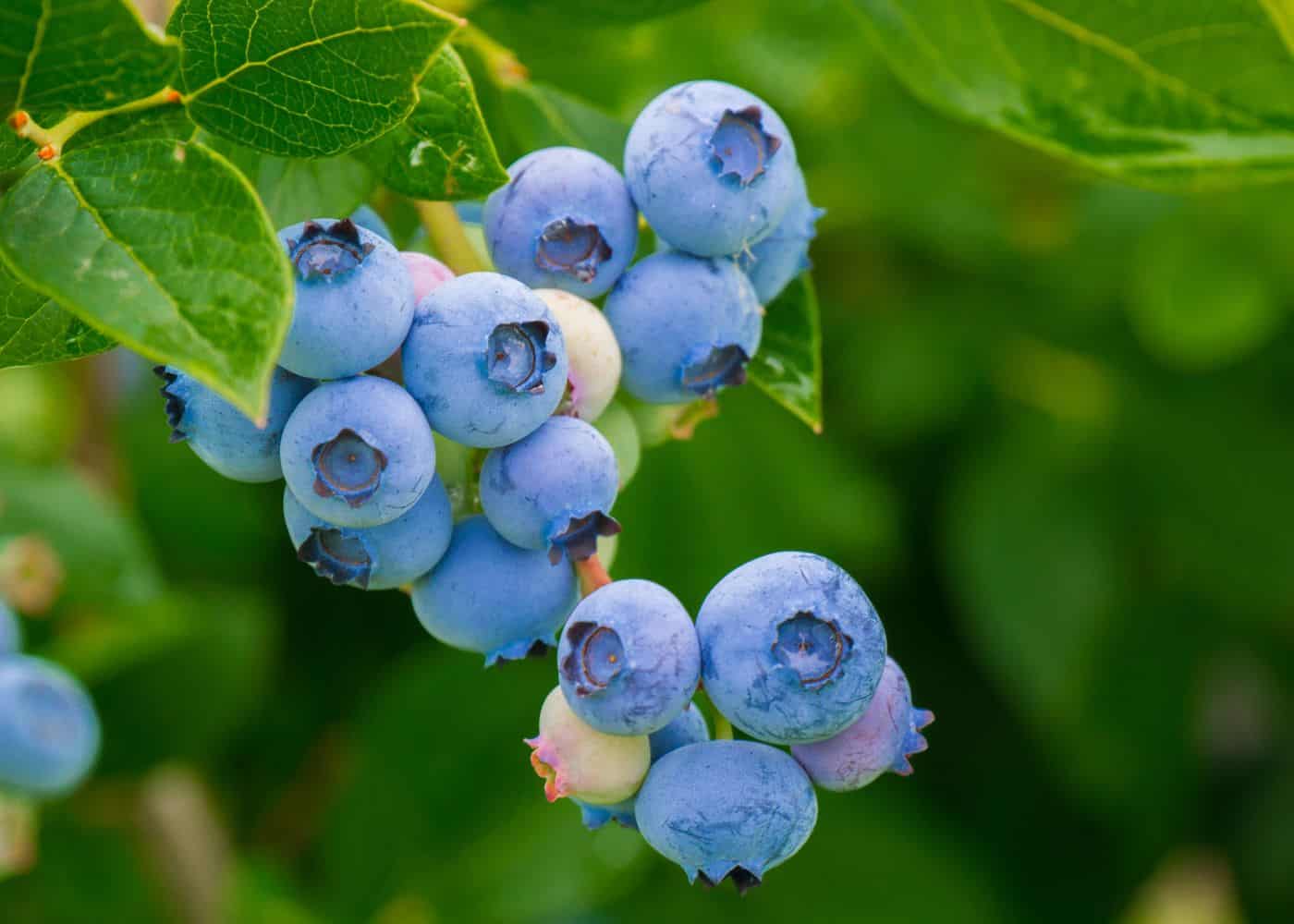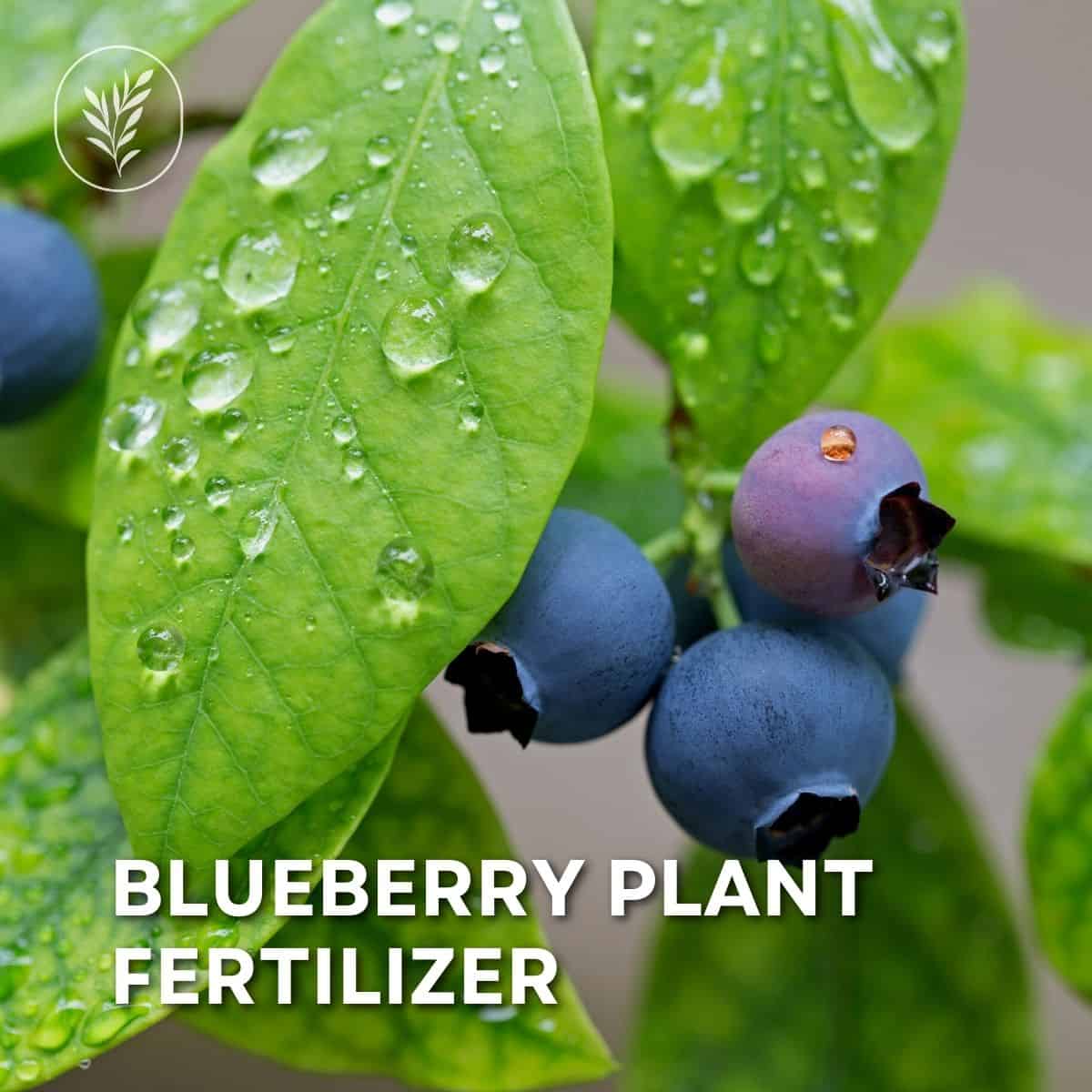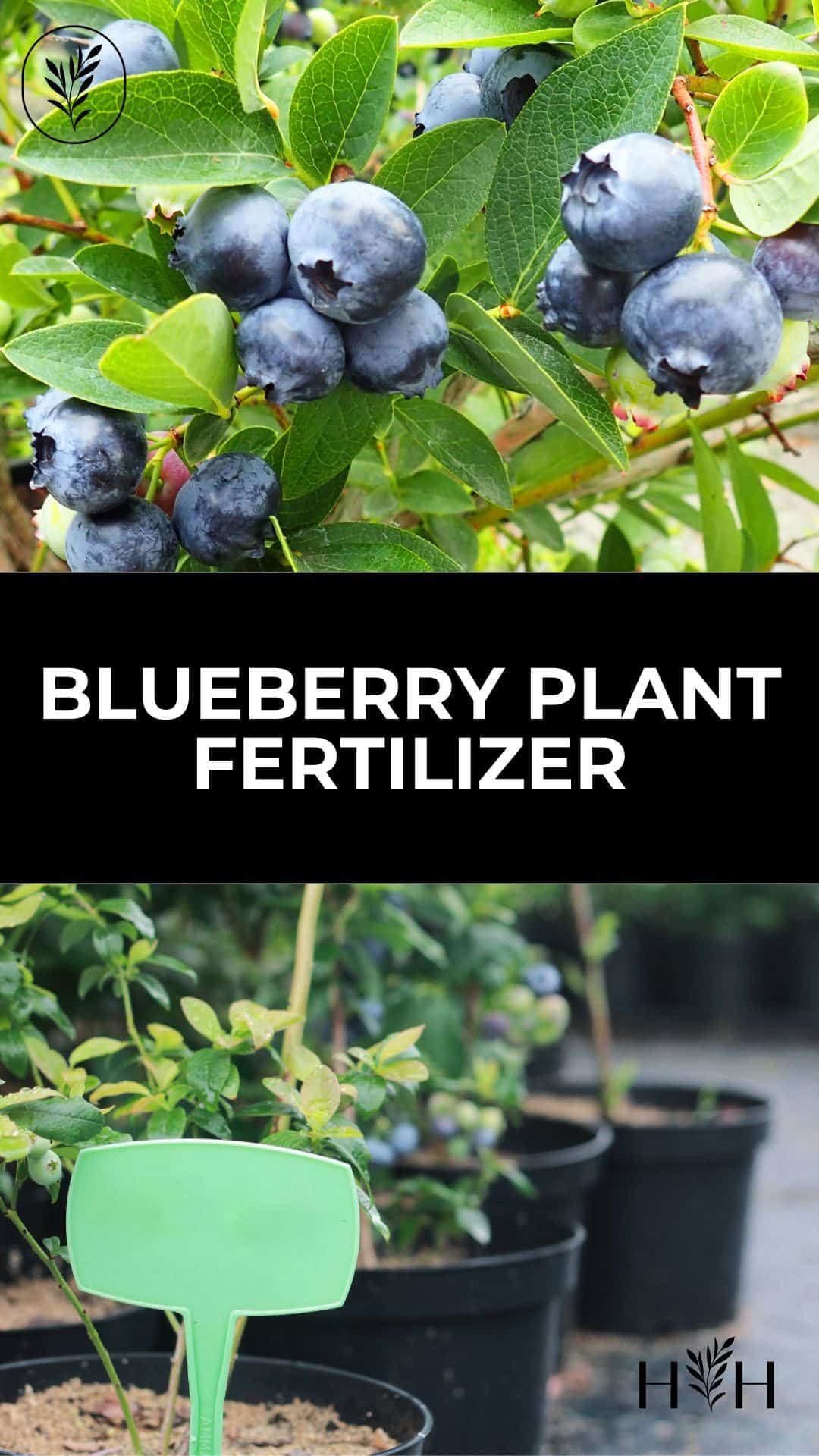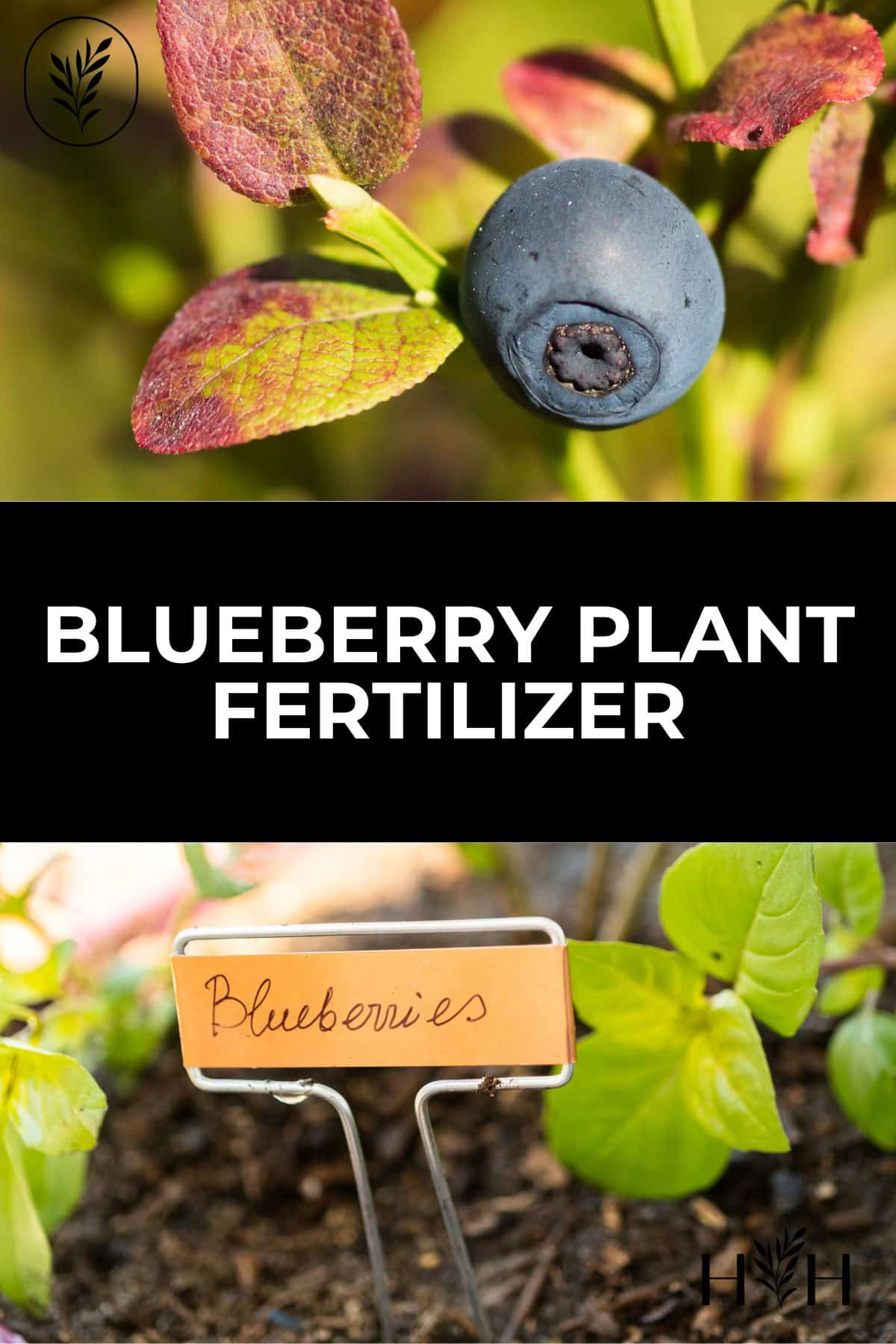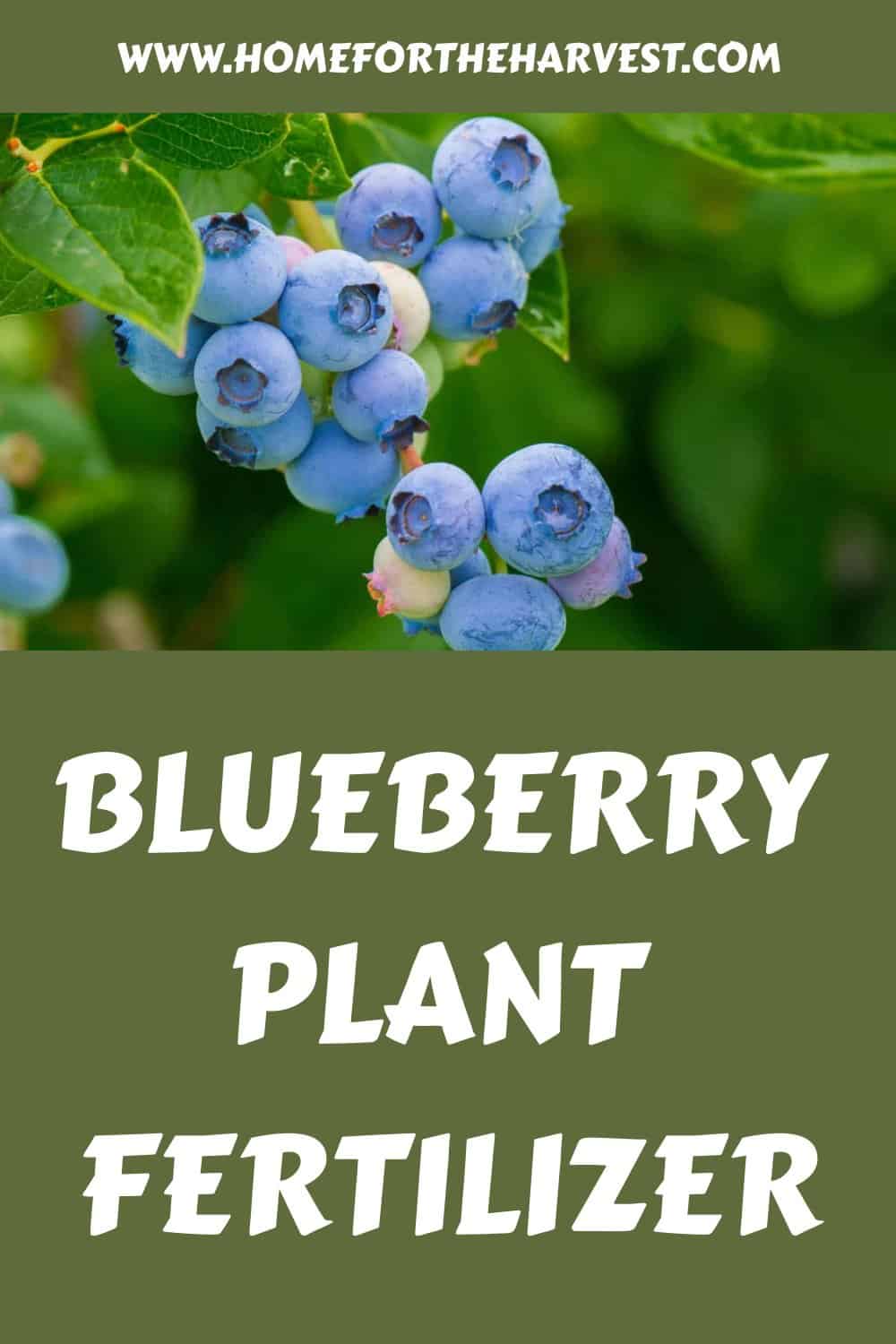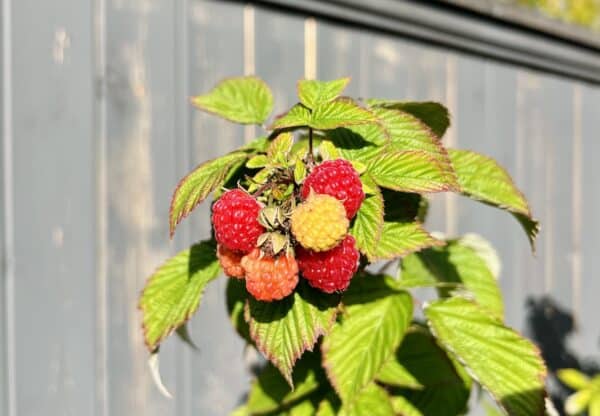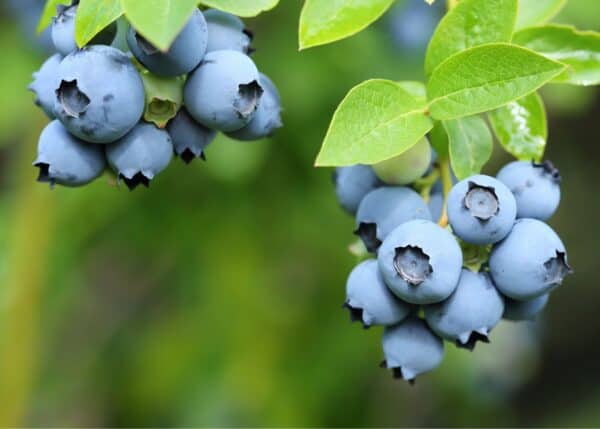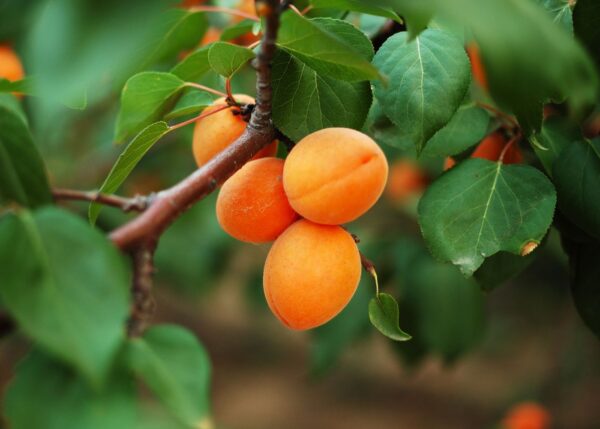Blueberry plant fertilizer helps ensure that your plants have all the nutrients they need for growth and development.
In this blog post, we’ll explore all aspects related to blueberry plant fertilizers including when it should be applied, how much needs to be used as well as some tips for application success.
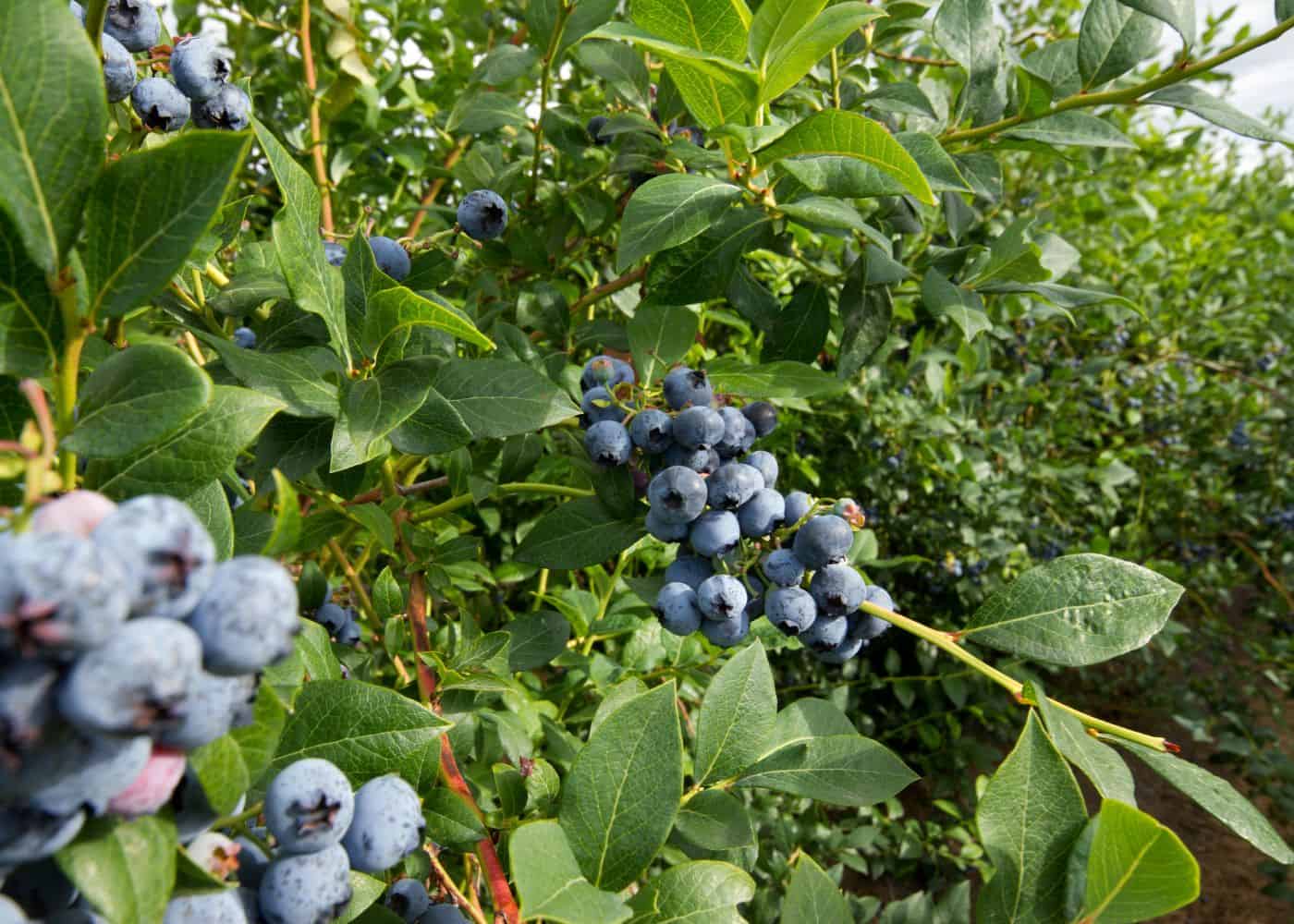
Blueberry plant fertilizer basics
Blueberry plant fertilizer is a specially formulated blend of nutrients designed to help blueberry plants grow and thrive. It incorporates key macro-elements like nitrogen, phosphorus, and potassium as well as micro-constituents such as iron, zinc, and manganese to promote the growth of your blueberry plants. The necessary elements for the well-being of your blueberry shrubs are given by this blend of nutrients, enabling them to bear fruit.
Nitrogen helps promote healthy foliage growth while phosphorus encourages strong root development and flowering. Potassium helps increase disease resistance in plants by strengthening cell walls which makes them less susceptible to pests or diseases. Iron is an important component of chlorophyll production which allows photosynthesis to occur so that your plants can make food from sunlight. Zinc aids in the formation of enzymes needed for proper metabolism while manganese helps activate certain enzymes necessary for photosynthesis and respiration processes within the plant cells.
Applying fertilizer correctly is key though – too much can cause burning or even death of the plant if not done properly. For optimal fertilizer usage on your blueberry plants, it’s wise to consult with a local gardening expert who can give advice tailored to your individual situation.
For blueberry plants to flourish and bear succulent fruit, it is essential to apply a suitable fertilizer. So, when should one go about fertilizing those lovely blueberry plants?
When should you fertilize blueberry plants?
Blueberry plants are most commonly fertilized in the spring. The best time to fertilize blueberry plants is when the temperature of the soil reaches about 50°F (10°C) in early spring. This timing will supply them with an energy surge for their spring growth and fruit production. This will give the plants a boost of energy to start growing and producing fruit.
When you fertilize, it’s important to use the right type of fertilizer for your particular variety of blueberries. Different blueberry types necessitate varying fertilizers; thus, consult your local gardening center for the most suitable fertilizer for your particular requirements.
It’s also important to apply the fertilizer correctly. Too much can burn the roots and too little won’t do anything at all. To ensure that you get just enough, spread a layer around each plant according to package instructions and water it in well after application. You should also avoid getting any fertilizer directly onto leaves or stems as this could cause damage or burning.
Once applied, you should see results within two weeks if done properly – including increased growth rate and improved leaf coloration – but make sure not to over-fertilize as this can lead to nutrient deficiencies down the line. If possible, have a soil test done before applying any fertilizer so that you know exactly how much nitrogen, phosphorus, and potassium (NPK) are needed by your plants for optimal health and productivity.
Regularly reapplying fertilizer is essential to ensure your garden flourishes. Some formulas are long-lasting and may not need to be re-applied, but others may need to be done every 4-6 weeks. Plan accordingly and with proper care and attention given during these times, you can expect beautiful blooms come summertime along with plenty of delicious berries from your own backyard garden.
Realizing when to give your blueberry plants fertilizer is essential for them to get the nutrients they need in order to thrive and produce. Now, let’s delve into what quantity of fertilizer is necessary for obtaining the most beneficial outcome.
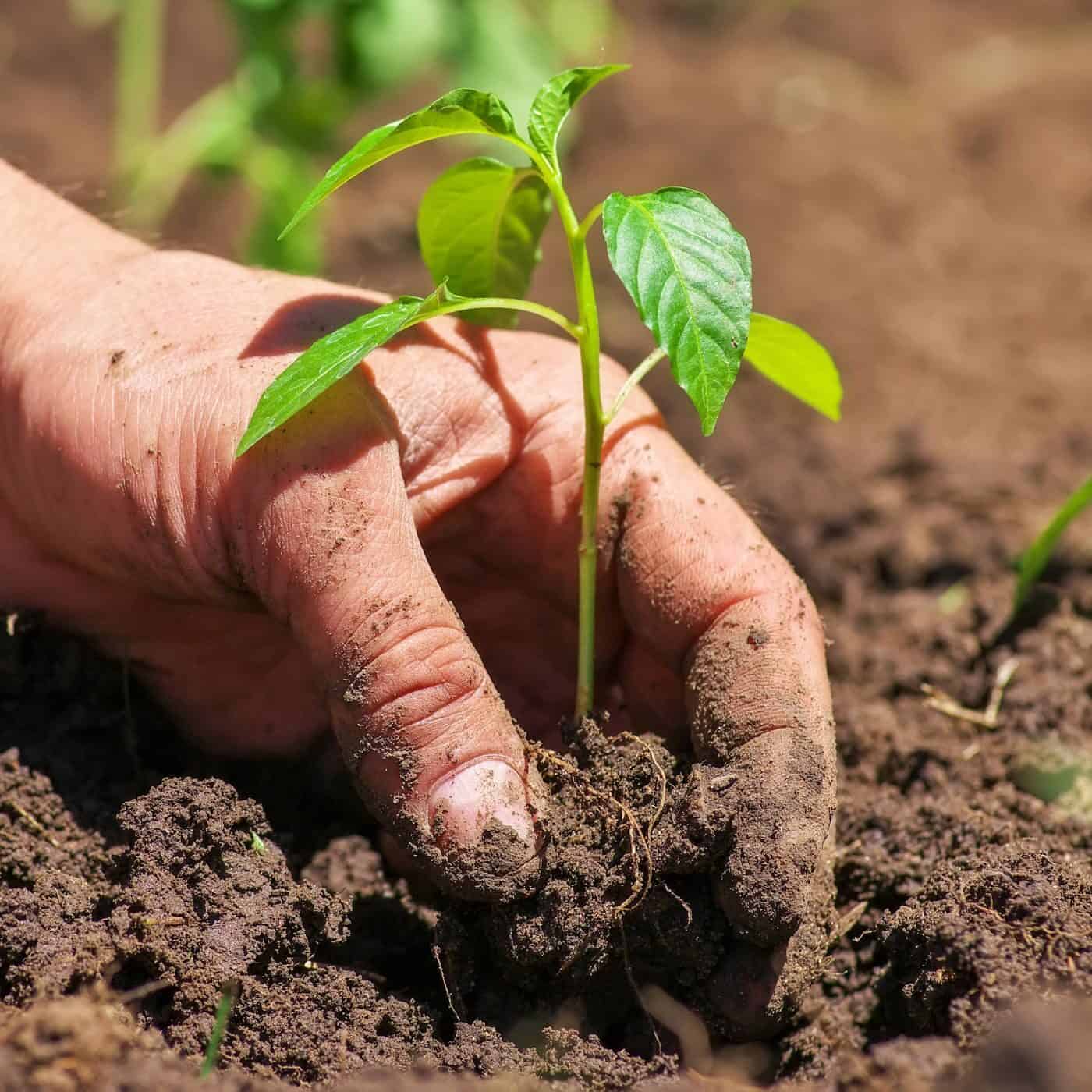
How much fertilizer should you use?
Fostering your blueberry shrubs is a crucial element in maintaining their vigor and yielding delectable berries. But how much fertilizer should you use?
What type of fertilizer should you use?
When it comes to fertilizing blueberries, there are a few different types that can be used. The most common type is a slow-release granular fertilizer, which releases nutrients over time into the soil. This type of fertilizer is best for blueberries because it helps keep the soil evenly nourished throughout the growing season. Organic fertilizers, like compost or manure, can also be used to nurture blueberry plants.
How much fertilizer should you use?
The quantity of fertilizer to utilize depends on the stature of your blueberry plants and the nature of the soil they are situated in. Generally speaking, most brands recommend about 1/4 cup of fertilizer per plant every application. That said, there is a lot of variation in nutrient concentrations and product formulations, so be sure to follow the instructions on the product you purchase.
If your soil is sandy or your plants are small and young, you may want to slightly decrease the amount of fertilizer; on the other hand, if the soils are clay-based or your plants are big and mature, then you might need to increase it a bit. It’s always better to err on the side of caution when applying any kind of chemical product like fertilizer – too much can cause damage.
When is the best time to apply fertilizer?
It’s generally recommended that you apply fertilizer at least once every two weeks during the active growing season (spring through early fall). However, some gardeners prefer to wait until after their first harvest before applying any additional nutrients so as not to disrupt flowering or fruiting processes already underway in their gardens. In addition, many experts recommend avoiding application just prior to heavy rains since excess runoff could carry away valuable nutrients from your garden beds before they have had a chance to take effect in improving plant health and vigor.
Soil type
Different types of soils require different amounts of fertilizer. If you have sandy soil, for example, it may need more frequent fertilization than clay or loam soils. It’s best to test your soil before adding any fertilizer so that you know exactly what kind of nutrients it needs.
Plant size
The size of your blueberry plants will also determine how much fertilizer you should use. Generally speaking, small plants need less than larger ones do. For a typical plant about two feet tall, 1/4 cup per plant every two weeks during the growing season is usually enough to keep them healthy and productive.
Organic fertilizers
Organic fertilizers such as compost or manure can be used instead of chemical fertilizers if desired. These organic options release their nutrients slowly over time which can help prevent nutrient burn or leaching into nearby water sources like streams or lakes if used correctly according to package instructions.
Application method
Once you’ve determined how much fertilizer to use, it’s important to apply it properly so that all parts of the plant get an even amount without any excess runoff into nearby areas where it could cause environmental damage or health risks for people and animals alike. One way to ensure this is by using a drop spreader rather than a broadcast spreader which disperses too widely and often results in uneven coverage with some spots getting too little while others get too much fertilizer at once.
Finally, timing is key when applying fertilizer – especially if using synthetic varieties – as these tend to break down quickly in hot weather conditions making them ineffective after just a few days unless reapplied regularly throughout the season (usually every 2-3 weeks). Applying organic options right before rain showers can help ensure that they reach deep down into the root zone where they are most needed without being washed away by heavy rains.
By comprehending the precise amount of fertilizer to apply, you can guarantee that your blueberry plants acquire the essential nutrients for vigorous growth. Now let’s explore what benefits come from fertilizing blueberry plants.
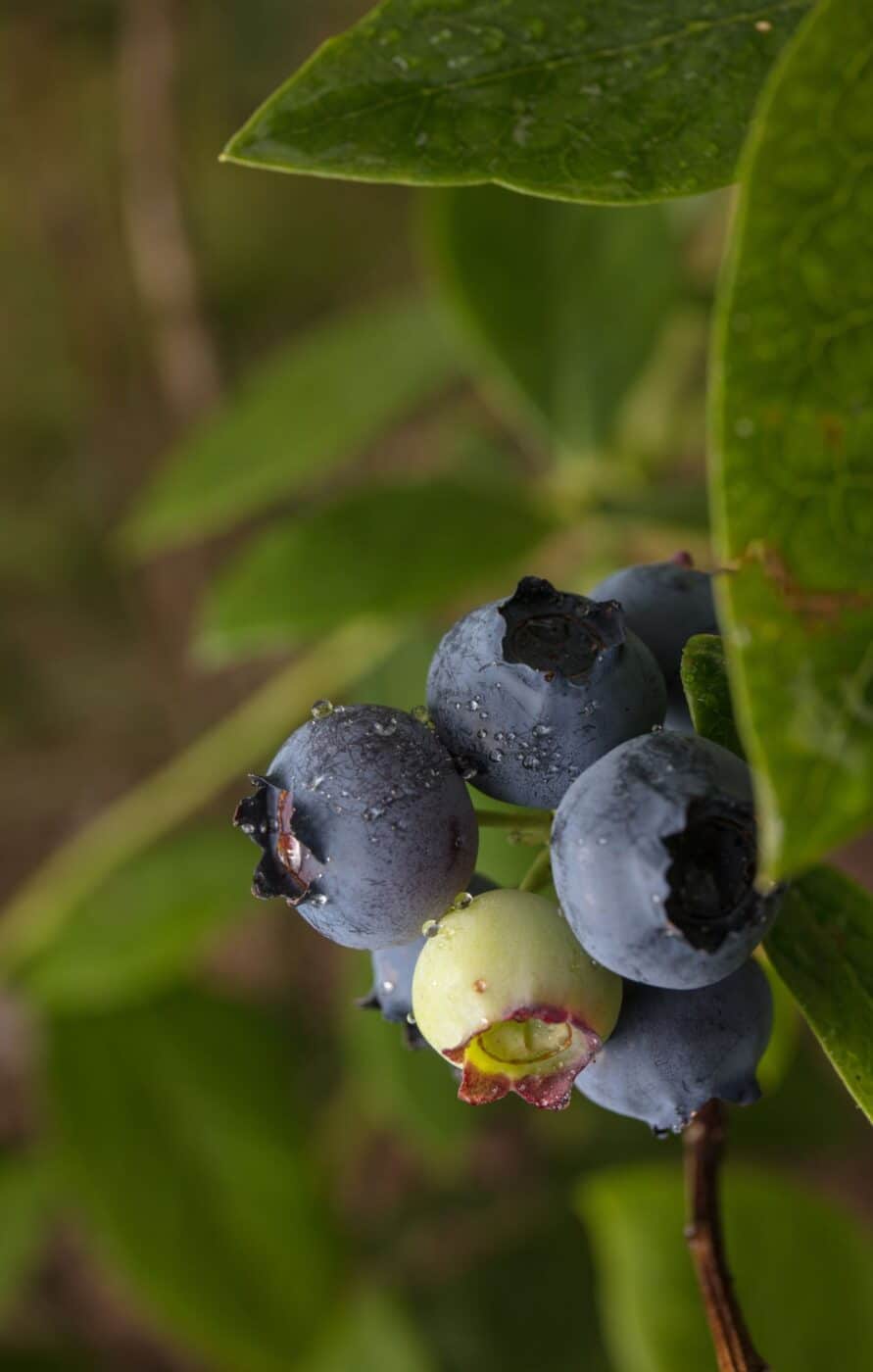
What are the benefits of fertilizing blueberry plants?
Applying fertilizer to your blueberry plants can be beneficial in a variety of ways, such as boosting their output and supplying them with essential nutrients that may not naturally occur in the soil.
Fertilizing blueberry plants offers a range of advantages; from amplified harvests to augmented vigor, there are many motives why this technique is advantageous for both gardeners and their gardens. Fertilizers provide essential nutrients like nitrogen, phosphorus, potassium (NPK), calcium magnesium sulfate (Epsom salt) iron chelates which help promote strong root systems as well as healthy foliage growth throughout the growing season. Additionally, regular applications will encourage better flowering and berry production come harvest time.
FAQs about blueberry plant fertilizer
What is the best fertilizer for blueberries?
For the best outcome with blueberries, combine organic material such as compost or aged manure along with a general-purpose fertilizer featuring an equal amount of nitrogen, phosphorus, and potassium. This combination will provide the necessary nutrients to promote healthy growth and abundant fruit production.
For optimal results, apply the fertilizer in early spring when new growth begins and again mid-summer after harvest. Be sure to follow the directions on your specific product for proper application rates. Ensuring your blueberry plants flourish and yield a succulent harvest of berries can be achieved with the appropriate fertilizer.
What is the best natural fertilizer for blueberries?
The best natural fertilizer for blueberries is a combination of compost, manure, and bone meal. Compost provides essential nutrients to the soil while also improving its structure and water-holding capacity.
Manure adds additional nitrogen and other minerals to the soil, helping promote healthy growth in plants. Bone meal is an excellent source of phosphorus which helps with root development as well as flower production. All three components work together to create a balanced fertilizer that will help your blueberry bushes thrive.
When should you fertilize blueberry bushes?
Maintaining blueberry bushes requires fertilization to ensure their well-being and productivity. The best time to fertilize your blueberry bushes is in early spring, just before new growth begins. This will give the plants a boost of nutrients for the upcoming growing season.
Additionally, it’s beneficial to apply fertilizer again in mid-summer after fruit has set but before ripening begins. Avoid fertilizing late in the season as this can cause tender new growth that may not survive winter cold temperatures. Always follow package instructions when applying fertilizer and water thoroughly afterward to ensure proper absorption into the soil.
Are coffee grounds good fertilizer for blueberries?
Yes, coffee grounds are an excellent fertilizer for blueberries, particularly after they have been composted with some yard trimmings. They provide essential nutrients like nitrogen and potassium which help the plant to grow healthy and strong.
Coffee grounds also contain organic matter that helps retain moisture in the soil, allowing your blueberry plants to stay hydrated during dry spells. Additionally, they can improve drainage by breaking up heavy soils and preventing compaction. Used sparingly, composted coffee grounds make a great addition to any garden.
Before you go…
By following the tips outlined in this article, you can ensure that your blueberry plant fertilizer will be applied correctly and provide maximum benefit to your plants. By investing some time and energy, you can reap the rewards of succulent blueberries for a long period. So don’t forget – fertilize those blueberry plants regularly with the right amount of fertilizer for the best results.
Resources
- Companion plants for blueberries (and what not to plant nearby)
- When to fertilize blueberries: Seasonal plant food timing for blueberry bushes
- A gardener’s guide to pruning blueberries
- When to prune blueberry bushes?
- How to prune blueberry bushes?
References
- James, L. (2019). Blueberry Cultivation: A Guide On How To Grow Blueberries. Independently Published.
- Gault, K. S. (2010). The Complete Guide to Growing Your Own Fruits and Berries: Everything You Need to Know Explained Simply (p. 147). Atlantic Publishing Company.
- Beckwith, C. S. (2011). Cranberry and Blueberry Culture – With Information Relating to Growing for Profit. Read Books Ltd.
- University of Minnesota (n.d.). Pest management for home blueberry plants. University of Minnesota Digital Conservancy. https://conservancy.umn.edu/handle/11299/198099
Need more info?
Are you interested in learning more about blueberry plant fertilizer? Here are our best articles about it!


